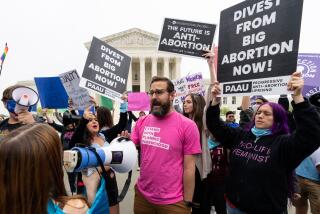‘Dial-a-Porn’ Dealt High Court Setback : Judiciary: Justices let stand rules that force customers to write to their phone company for access to sexually explicit services.
WASHINGTON — The Supreme Court dealt a serious blow to the once-booming “dial-a-porn” business Monday, letting stand federal rules that force customers to ask their phone companies in writing for access to sexually explicit services.
The court rejected arguments by dial-a-porn company lawyers that the rules violate constitutional free-speech guarantees.
“As a practical matter, the industry is history, a thing of the past,” said Nick Selby, a Palo Alto lawyer who represents the Information Providers Coalition, a group of companies that provides such services.
In a ruling opposed by the Bush Administration, the high court also ruled Monday that Southern governments do not need federal approval under the Voting Rights Act of 1965 before reallocating political power among elected officials--even if the changes blunt black voters’ clout.
The high court action in the dial-a-porn case ends a legal fight that stretched over nearly a decade in the courts, Congress and state Legislatures. In the early 1980s, when for-pay phone services became available, dial-a-porn became an $800-million a year business. Outraged parents demanded that lawmakers take action.
Congress and the Federal Communications Commission devised rules that would have limited the calls only to late-night hours. But those rules were struck down by lower federal courts as violations of free-speech provisions of the First Amendment because they also prohibited adults from receiving the messages during the day.
Three years ago, a unanimous Supreme Court struck down a congressional ban on all “indecent” phone messages. The justices said the First Amendment did not permit the government to regulate phone conversations between adults. But the court also made clear that the government could seek to prevent minors from gaining access to these messages.
After that ruling, Sen. Jesse Helms (R-N.C.) sponsored legislation to require phone companies to employ “reverse blocking” procedures upheld Monday for all phones.
Four New York phone services filed suit challenging the “Helms amendment” and a federal judge in New York blocked the law. But last July, the U.S. 2nd Circuit Court of Appeals overturned that ruling.
The companies appealed the case (Dial Information Services vs. Barr, 91-697) to the Supreme Court. Their lawyers argued that the new law “has broadly and unnecessarily curtailed--if not destroyed--adult access to lawful, protected speech.”
The Supreme Court rejected the appeal without comment Monday.
The reverse-blocking rules went into effect in California last March, after they were upheld by the California-based 9th Circuit Court of Appeals in San Francisco. Pacific Bell and GTE announced in October that they no longer would bill customers for dial-a-porn calls.
In the voting rights case, the court, by a 6-3 vote, ruled that changes in political power in two Alabama counties were not covered by the “pre-clearance” requirement of the Voting Rights Act of 1965.
“Changes which affect only the distribution of power among officials are not subject (to the act) because such changes have no direct relation to, or impact on, voting,” Justice Anthony M. Kennedy wrote for the court. The changes had the effect of depriving newly elected black commissioners of power exercised by white predecessors. Justices Byron R. White, John Paul Stevens and Harry A. Blackmun dissented in the case (Presley vs. Etowah County Commissioners, 90-711, and Mack vs. Russell County, 90-712).
The three dissenting justices accused the majority of turning a blind eye to the South’s history of using “subtle,” as well as blatant, methods to strip blacks of power.
The court also refused to hear an appeal from California officials seeking to modify a 1980 consent decree governing the living conditions for San Quentin’s Death Row inmates (Rowland vs. Thompson, 90-1499). State Atty. Gen. Dan Lungren said the order should be lifted because the state was in full compliance with the Constitution. But lawyers for the prisoners said the state had not complied fully with the 1980 decree.
More to Read
Get the L.A. Times Politics newsletter
Deeply reported insights into legislation, politics and policy from Sacramento, Washington and beyond. In your inbox three times per week.
You may occasionally receive promotional content from the Los Angeles Times.











